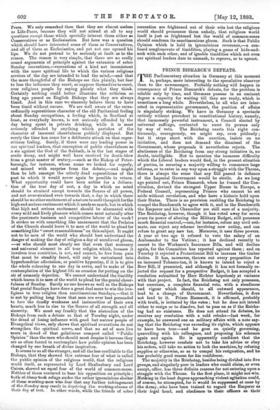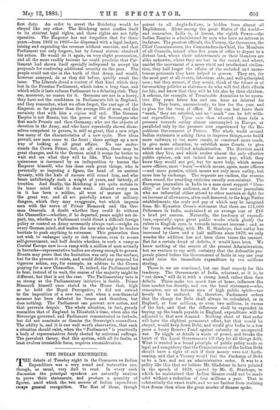PRINCE BISMARCK'S DEFEATS.
THE Parliamentary situation in Germany at this moment is, perhaps, more interesting to the speculative observer than to the newsmonger. Probably nothing will happen in consequence of Prince Bismarck's defeats, for the problem is soluble only by time, and Germans possess in an eminent degree a capacity for waiting till they are ready, which is sometimes a long while. Nevertheless, to all who are inter- ested in representative government, the position of affairs is singularly striking. We have in Germany a spectacle entirely without precedent in constitutional history, namely, that immensely powerful instrument, a Council elected by universal suffrage, contented to exert its powers only by way of veto. The Reichstag exerts this right con- tinuously, courageously, we might say, even pitilessly ; but it stops short with the exertion, insists on no initiative, and does not demand the dismissal of the Government, whose proposals it nevertheless rejects. The abstinence of the Reichstag from any strong initiative is, no doubt, intelligible. Not to mention the immense difficulty which the Liberal leaders would find, in the present situation of parties, in securing a majority willing to commence large reforms, or to enter in any way upon a struggle with the Throne, there is always the sense that any Bill passed in defiance of the Imperial Government would be sterile. As we long ago pointed out, Prince Bismarck, when he framed the Con- stitution, devised the strongest Upper House in Europe, a Federal Council, representing Princes who cannot be set aside without revolution, and who have a historic hold upon their States. There is no provision enabling the Reichstag to compel the Bundesrath to agree with it, and in the Bundesrath the Emperor and his Chancellor are still sure of a majority. The Reichstag, however, though it has voted away for seven years its power of altering the Military Budget, still possesses much financial control,---can, for instance, refuse any civil esti- mate, can reject any scheme involving new outlay, and can refuse to grant any new tax. Moreover, it uses these powers. A year or two ago it refused to vote the salary of an Ambassador to the Vatican ; it has declined recently to assent to the Workmen's Insurance Bills, and will decline again, for the Committee has reported against them ; and on Tuesday it rejected a Protectionist Bill to increase the timber ditties. It has, moreover, thrown out every proposition for an increased Tobacco-tax, it is known to intend to reject a Beer Bill, if presented, and although it has not formally re- jected the request for a prospective Budget, it has accepted a resolution submitted by Herr Richter hopelessly at variance with that project. In fact, the Reichstag not only possesses, but exercises, a complete financial veto, with a steadiness and vigour which should, to all outward appearance, lead to a change of Government. Nevertheless, it does not lead to it. Prince Bismarok, it is affirmed, probably with truth, is irritated by the votes ; but he does not intend either to resign or to dissolve, but to pass on as if the Reichs- tag had no existence. He does not attend its debates, he receives any resolution with a cold rebuke—last week, for example, he answered one on military affairs with a note say- ing that the Reichstag was exceeding its rights, which appears to have been true—and he goes on quietly governing, quarrelling with his colleagues, and proposing his schemes again and again. He is apparently confident that the Reichstag, however resolute not to take his advice or ebey his orders, will take no action to lock the machine, by refusing supplies or otherwise, so as to compel his resignation, and he has probably good reason for his confidence.
The majority in the Reichstag, besides being divided into five groups, and singularly poor in leaders who could claim, or even accept, office, has three definite reasons for not entering upon a struggle with the Throne. In the first place, it might not win. Nothing in the least degree approaching violent agitation could, of .course, be attempted, for it would be suppressed at once by the Army, who have been trained to regard the Emperor as their legal head, and obedience to their officers as their first duty. An order to arrest the Reichstag would be obeyed like any other. The Reichstag must confine itself to its strictest legal rights, and those rights are not fully operative. The Emperor has not forgotten that for three years—from 1863 to 1866—he dispensed with a legal budget, raising and expending the revenue without sanction, and that Parliament not only forgave, but by formal statute absolved his action. He would do it again, on very slight provocation, and all the more readily because he could proclaim that Par- liament had shown itself specially indisposed to accept his proposals for conferring additional security on the poor. The people could not rise in the teeth of that Army, and would, however annoyed, do as they did before, quietly await the issue. The Liberals dread a contest of that kind which they lost in the Prussian Parliament, which takes a long time, and which while it lasts reduces Parliament to a debating club. They see, moreover, no reason for it. Germans are not in a hurry, they have not the confidence in Parliaments felt in England, and they remember, what we often forget, the vast age of the Emperor, so far greater than the average life of man, and the certainty that with him a re'gime will end. The German Empire is not Russia, but the power of the Sovereigns who first made Prussia and then Germany, who are the objects of devotion in the Army, and who have repeatedly shown them- selves competent to govern, is still so great, that a new reign has many of the characteristics of a new cycle. New ideas prevail, new men come to the front ; there springs up a new way of looking at all great affairs. No one under- stands the Crown Prince, but, at all events, there may be great changes, and to the German mind it seems far better to wait and see what they will be like. This tendency to quiescence is increased by an indisposition to harass the Emperor himself, who has done such great things, who is personally so imposing a figure, the head of an ancient dynasty, with the halo of success still round him, and who bears unfalteringly such a weight of years, and latterly, of troubles. And finally, the Reichstag is not quite certain in its inner mind what it does want. Almost every man in it has been a soldier, all were of mature age in the great war, and all are painfully aware of military dangers, which they may exaggerate, but which impress men with the nerve of Prince Bismarck and the Ger- man Generals. A doubt whether they could do without the Chancellor—whether, if he departed, peace might not de- part, too, whether a Parliament could direct a difficult foreign policy or control an Army necessarily always vast—weighs on every German mind, and makes the men who might be leaders hesitate to push anything to extremes. This generation does not wish to endanger unity or risk invasion, even to secure self-government, and half doubts whether, in such a camp as Central Europe now is—a camp with a million of men actually in barracks—representative bodies are strong enough to govern. Events may prove that the hesitation was only on the surface, but for the present it exists, and would defeat any proposal for vigorous action, say, for example, an address to the Crown praying for a new Chancellor. If, indeed, the Parliament had to bear, instead of to wait, the course of the majority might be different, but that is not the case. The Parliamentary veto is as strong as the Parliamentary initiative is feeble. Prince Bismarck himself once stated in the House that, high as he held the Royal Prerogative, it did not extend to the imposition of a new tax ; and when a non-financial measure has been defeated he fumes and thunders, but does nothing. The Parliament can prevent new action, and that prevents despair. The whole situation, in fact, greatly resembles that of England in Elizabeth's time, when also the Sovereign governed, and Parliament remonstrated or forbade, but did not nominate or dismiss the Sovereign's counsellors. The oddity is, and it is one well worth observation, that such a situation should exist, when the "Parliament" is practically a body of representatives freely elected by universal suffrage. The prevalent theory, that this system, with all its faults, at least evolves irresistible force, requires reconsideration.



































 Previous page
Previous page